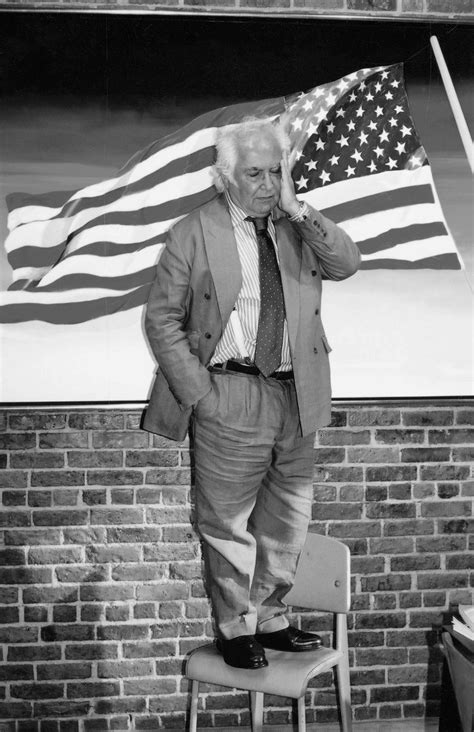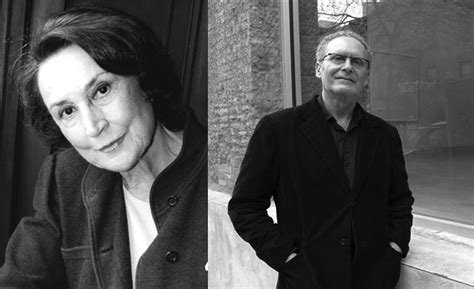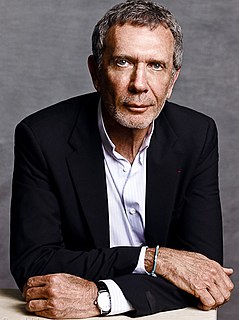A Quote by Tony Shafrazi
The breakdown of the modern movement led to what later became known as postmodern-whatever the hell that means-referring to the mixture of people and backgrounds that became a common thing among artists in America. Many of the great artists in America, for example, came from Jewish families and backgrounds that fled all the way from Russia. It's remarkable, the great masters of American art and cinema who were coming from old roots in little villages there. And then Hollywood, and the haunting, hypnotic impact that American Cinema had throughout the world . . .
Quote Topics
America
American
Among
Art
Artists
Backgrounds
Became
Breakdown
Came
Cinema
Coming
Common
Example
Families
For Example
Great
Great Art
Great Artist
Had
Haunting
Hell
Hollywood
Hypnotic
Impact
Jewish
Known
Later
Led
Little
Many
Masters
Means
Mixture
Modern
Movement
Old
People
Postmodern
Referring
Remarkable
Roots
Russia
Then
Thing
Throughout
Villages
Way
Were
Whatever
World
Related Quotes
The problem in Hollywood is that they try to become the only kind of cinema in the world, okay? The imposition everywhere of a unique culture, which is Hollywood culture, and a unique way of life, which is the American way of life. But Hollywood has forgotten that, in the past, what made Hollywood great and what made it go ahead was the fact that Hollywood was fed with, for example, Jewish directors coming from Germany or Austria and enriching Hollywood. In 15, 20 years, Hollywood became imperialistic. Cinema goes ahead when it is marriaged by other culture. Otherwise, it turns on itself.
I think Hollywood has gone in a disastrous path. It's terrible. The years of cinema that were great were the '30s, '40s, not so much the '50s...but then the foreign films took over and it was a great age of cinema as American directors were influenced by them and that fueled the '50s and '60s and '70s.
With a few exceptions like Kraftwerk, most great 20th century Western music is in some way American-based. And the great paradox of America, the paradox that distills America, is that this greatest of American contributions to humanity, this American contribution that probably has influenced more people around the world for the good, that probably has brought more people around the world unqualified joy, was born of America's greatest evil, slavery. Or one of the two great evils anyway, counting the European extinction of those who were on the continent first.
The great thing about cinema is that it's a great binder. It brings people from across the world together, often erasing the lines between geographies, languages, familiarity, and the like. Cinema is art and art, they say, is a reflection of life and society, so the way we tell our stories is the main differentiator for me.
What's happening in the larger world always influences art. When I first started the gallery in 1959, one of the first things I learned was that most people assume artists know one thing and one thing only - that they were idiot savants. I found very quickly that most artists were very informed and very aware of what was happening in the world around them. So all of those things go together, especially for earthworks. And at that time there was such an intense interest in American art. So there was a great deal of attention paid to where it was going.
We know that there were so many Japanese American soldiers in World War II who were fighting in Europe despite the fact that their families, their parents were back home in American prison camps. It's savagely ironic that between themselves and the African-American soldiers, who were also segregated and didn't see the fruition of the work the culminated in the Civil Rights Act until the '60s, that these American heroes and their stories are not well known; and the fact that the 442nd/100th became the most decorated unit in U.S. history.
If you look at my collaborations, it is very much in line with all these others in the sense that it is a building of community, particularly among artists of color. This is what I learned from the example of elder African-American artists, which is where it is all coming from; to refuse to be silenced.
Trump's vision for America parallels greatly with the vision that Ronald Reagan used and he implemented to revive the country during a very similar time where we had a president who told us that we were in a time of malaise in the American economy and that things are just gonna be that way for a while. Reagan steps up in that great first inaugural address and says, "And why shouldn't we dream great dreams? After all, we're Americans." And the American people came roaring back, the American economy came back.
Even in Haiti, I saw John Wayne movies. American cinema has always been the dominant cinema throughout the world, and people tend to forget that. People aren't just seeing these films in California or Florida. They're seeing them in Haiti, in Congo, in France, in Italy and in Asia. That is the power of Hollywood.
In the early 1990s we witnessed the emergence of a revitalized contemporary Chinese art world that began as a reaction against the government-approved Social Realist style. Zhang Xiaogang, Huang Yong Ping, Ai WeiWei, Yue Minjun, and Wang Guangyi were among the first group of artists to establish a movement that became known as Cynical Realism.
Cinema is a technologically mediated dreamspace, a way to access, a portal to the numinous that unfolded in the fourth dimension, so cinema became sort of a waking dream where we can travel in space and time, where we can travel in mind. This became more than virtual reality, this became a real virtuality.

































